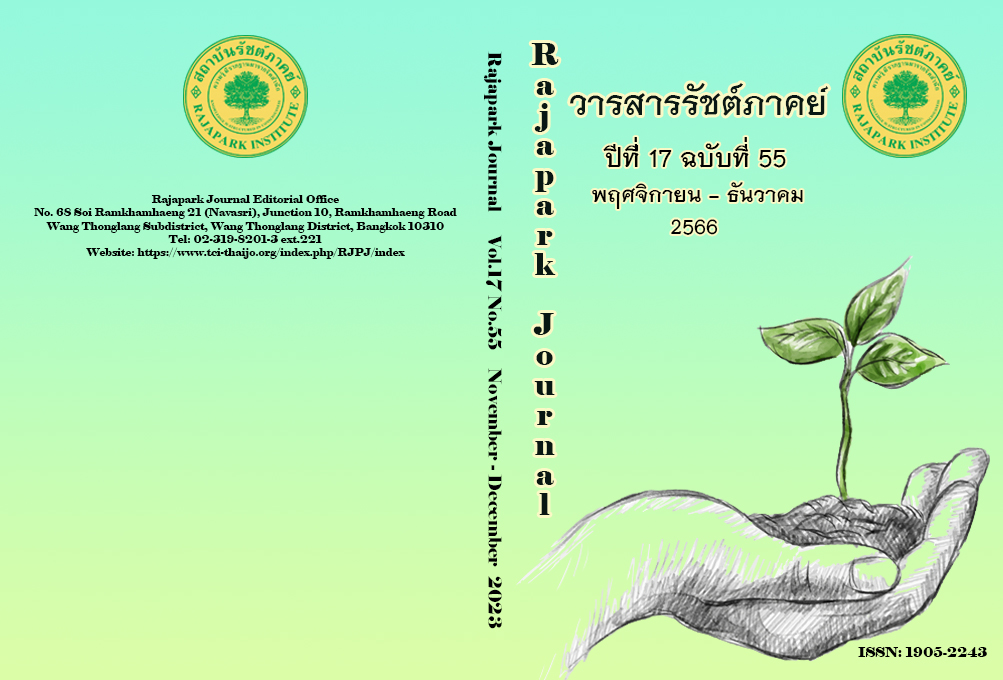Personal Financial Planning of Tour Guides in Chiangmai Province During COVID-19 Pandemic
Main Article Content
Abstract
The purpose of this study was to study the personal financial management of tour guides in Chiang Mai province during the COVID-19 pandemic. A questionnaire was used to collect data from the samples of 119 tour guides in Chiang Mai province, and an in-depth interview was used to collect data from 20 subjects. The data were analyzed using frequency percentile, mean standard deviation, and context analysis. The research findings were as follows: 1) Most of the guides are female, 41–50 years old, and single. They have 2–3 family members and hold a bachelor's degree. During the COVID-19 pandemic, most of the samples had revenue of less than 10,000 Baht, expenses per month of between 10,001 and 20,000 Baht, and did not have savings or investments. 2. Their personal financial management is as follows: 2.1) In revenue management, most of the samples had increased revenue from other jobs, and they had split the revenue proportion. 2.2) In expense management, most of the samples reduced unnecessary expenses and reviewed monthly expenses. 2.3) In saving and investment, most of the samples had many ways for saving and investment. 2.4) In debt management, most of the samples reviewed all debts, prioritized debt for closing, and did not make more debt.
Article Details

This work is licensed under a Creative Commons Attribution-NonCommercial-NoDerivatives 4.0 International License.
Views and opinions appearing in the Journal it is the responsibility of the author of the article, and does not constitute the view and responsibility of the editorial team.
References
Admission Premium. (2017). Tour Guide or Guide What Do They Do? How Much their Income?. https://www.admissionpremium.com/hotel/news/3144
Amazing Thailand. (2022). Guidance for Chiangmai. https://thai.tourismthailand.org Chanthanasiri, S. (2020). Personal Financial Management of Civil Servants under the Ministry of Education Retired at the End of the Fiscal year 2019. Faculty of Business Administration, Ramkhamhaeng University.
Department of Disease Control. (2021). Economic and Social Impact of COVID-19 Pandemic in World and Thailand. https://ddc.moph.go.th/uploads/publish/1177420210915075055.pdf
Division of Tourism Business and Guide Registration North Center. (2022). Statistic of Tours. https://www.mots.go.th/more_news_new.php?cid=411
Ministry of Tourism and Sports. (2022). Tourist Statistics. https://www.mots.go.th/more_news_new.php?cid=411
Nainamat, K., & Huttasin, N. (2019). Personal Financial Management Behaviors of Employees in Local Administrative Organizations in Khemarat District, Ubon Ratchathani Province. Journal of Management Science, Ubon Ratchathani University, 8(16), 32-51. https://so03.tci-thaijo.org/index.php/jms_ubu/article/view/178354
Sektrakul, K. (2010). Personal Finance Planning: When People Wealth Nation will Wealth too. SET. https://member.set.or.th/set/education/knowledgedetail.do?contentId=535&type=article
Teeratansirikool, L. (2020). Personal Finance Management Techniques in Crisis. Journal of Management Science Review, 7(2), 150-163. https://kuojs.lib.ku.ac.th/index.php/jfam/article/view/4089
Yamane, T. (1973). Statistics: An Introductory Analysis (3rd ed.). Harper and Row.
Yuwasute, P. (2014). Guide. http://payomyuvasuta1.blogspot.com/2011/10/blog-post.html


